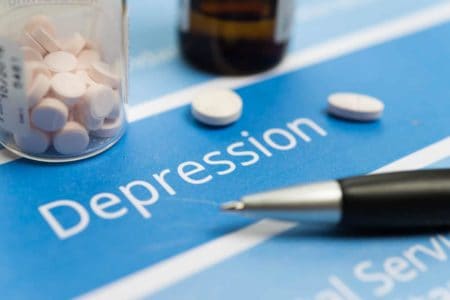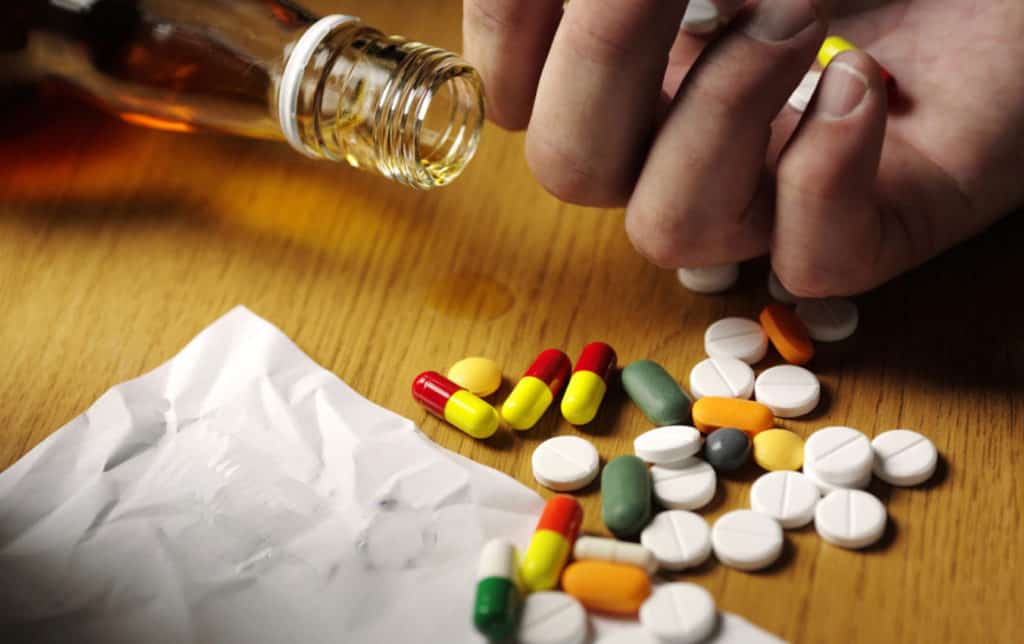Benzodiazepines for the Treatment of Anxiety
Benzodiazepines are among the most widely prescribed drug classes in the United States. Benzodiazepines are a class of psychoactive drugs known for their depressant effect on the central nervous system (CNS) [1]. Related to their rapid onset and immediate symptom relief. Benzodiazepines are used for those struggling with sleep, anxiety, spasticity due to CNS pathology, muscle relaxation, and epilepsy.
One of the debilitating side effects of benzodiazepines is their addictive potential. The dependence on benzodiazepines generally leads to withdrawal symptoms. Regular use of these drugs has been shown to cause severe, harmful psychological and physical dependence, leading to withdrawal symptoms similar to that of alcohol withdrawal.

Benzodiazepines, discovered in the early 1960s, are still a mainstay in the treatment of anxiety disorders. Anxiety disorders are a group of conditions that includes generalized anxiety disorder (GAD), social anxiety disorder (also called social phobia), panic disorder, posttraumatic stress disorder (PTSD), obsessive-compulsive disorder (OCD), and phobias. These disorders are common, and the cost of anxiety disorders in the United States has been estimated at over $64.5 billion per year [2].
In the United States, benzodiazepines approved for the treatment of anxiety disorders include alprazolam (sold under the brand name Xanax), chlordiazepoxide (Librium), clonazepam (Klonopin), clorazepate (Tranxene), diazepam (Valium), lorazepam (Ativan), and oxazepam (Serax). Anxiety can be treated with benzodiazepines alone or in conjunction with other medications, including antidepressants, such as selective serotonin reuptake inhibitors (SSRIs) and serotonin and norepinephrine reuptake inhibitors (SNRIs), antipsychotic agents, and mood stabilizers.
How Benzodiazepines Work for Anxiety
Benzodiazepines are commonly administered via the oral and intravenous routes. The FDA strongly reminds providers that extreme care should be taken when administering benzodiazepines with other central nervous system depressants such as alcohol, barbiturates, and opioids. Benzodiazepines quickly diffuse through the blood-brain barrier to affect the inhibitory neurotransmitter GABA and exert sedative effects. GABA is the most common neurotransmitter in the CNS (brain and spinal cord). This action results in a slowing of the central nervous system (CNS), inducing a state of relaxation.
How Benzodiazepines Work for Depression
Depression often presents with anxiety. The rate of anxiety comorbidity among patients with depression varies between 33% to 85%. All benzodiazepines are listed as DEA schedule IV controlled substances. As controlled substances, all benzodiazepines have the potential for abuse, addiction, and diversion [3]. As many as 40 percent of patients with a depressive disorder may be prescribed benzodiazepines as treatment. When examining the relationship between benzodiazepines and depression treatment, studies have not found a connection between the severity of depression and the use of benzodiazepines.
However, it appears the symptom is known as anhedonia—or loss of pleasure—is an indicator of whether benzodiazepines will be prescribed for depression treatment. Other common conditions that are prescribed a benzodiazepine prescription for depressive disorders include insomnia and depression-related anxiety. Despite studies showing that benzodiazepines are not necessarily more effective than placebos for treating depressive disorders, they continue to be used.

Get Your Life Back
Find Hope & Recovery. Get Safe Comfortable Detox, Addiction Rehab & Dual Diagnosis High-Quality Care.
Hotline(844) 597-1011SSRIs and Benzodiazepines for General Anxiety Disorders (GAD)
Generalized anxiety disorder (GAD) is a common form of anxiety disorder. Selective serotonin reuptake inhibitors (SSRIs), serotonin and norepinephrine reuptake inhibitors (SNRIs), and benzodiazepines (BZs) are the most commonly prescribed medications for GAD, but little is known about the relative efficacy of these pharmacological treatments.
Generalized Anxiety Disorder (GAD) is characterized by persistent and uncontrollable worry that is associated with various unpleasant physiological symptoms. It is a chronic illness that often begins during adolescence or early adulthood and persists throughout the lifespan. GAD affects up to 5% of children and adolescents and between 3–6% of adults.

Selective Serotonin Reuptake Inhibitors (SSRIs) include medications such as Zoloft (sertraline), Prozac (fluoxetine), Celexa (citalopram), and Lexapro (escitalopram). These medications work on serotonin, an important neurotransmitter that plays a role in feelings of well-being and happiness, as well as thinking, memory, sleep, digestion, and circulation.
SSRIs are considered the first-line medication for GAD, and will typically be prescribed first. Benzodiazepines are considered a second-line or adjunctive medication for GAD, though are still prescribed frequently, especially when a person complains of panic attacks, sleep problems, severe muscle tension, or avoidance of specific situations due to anxiety.
Side Effects of Benzodiazepine Use
Sleepiness is the most common side effect of benzodiazepines. Your first dose of a benzodiazepine puts you at increased risk of getting into accidents. You shouldn’t drive a car or operate machinery while taking benzo until you know how your body will react to the drug.
Benzos aren’t recommended for long-term use because they become less effective over time. As the body continues to adapt to the presence of the benzo, it requires higher doses to feel a therapeutic effect. This is called tolerance. One of the debilitating side effects of benzodiazepines is their addictive potential.
Individuals who take benzodiazepines without a prescription or use the drugs to get high can experience severe side effects. An excessive dose can make a person pass out. Combining benzodiazepines with other substances is especially dangerous. Mixing benzodiazepines with other depressants can cause life-threatening side effects.
Short-Term Side Effects
When they’re taken as prescribed, common side effects of benzos are generally mild. These side effects usually subside as the body adapts to the benzo. Common short-term side effects of benzos include:
- Appetite loss
- Drowsiness
- Coordination loss
- Dry mouth
- Impaired memory
- Nausea
- Relaxation
- Vision problems
- Slowed breathing
- Slowed motor function
Long-Term Side Effects
As mentioned above, benzos are rarely prescribed for long-term use because they change the way the brain functions. Over time, people who take benzodiazepines begin to rely on the drugs to feel normal. This is called dependence.
Benzodiazepine dependence is a serious long-term side effect of regular benzo use. It can cause harmful withdrawal symptoms when a person stops taking the drugs. Benzodiazepine withdrawal can be life-threatening if a person stops taking the drugs suddenly.
Long-term use of benzodiazepines is also associated with an increased risk of addiction. Some people can develop benzo dependence and not become addicted. But benzodiazepine addiction is one possible long-term side effect of benzo use.
Other long-term side effects of benzodiazepine use include:
- Confusion
- Cognitive decline
- Impaired judgment
- Increased risk of accidents
- Memory problems
- Slurred speech
- Muscle weakness
Get Help. Get Better. Get Your Life Back.
Searching for Accredited Drug and Alcohol Rehab Centers Near You?
Even if you have failed previously and relapsed, or are in the middle of a difficult crisis, we stand ready to support you. Our trusted behavioral health specialists will not give up on you. When you feel ready or just want someone to speak to about therapy alternatives to change your life call us. Even if we cannot assist you, we will lead you to wherever you can get support. There is no obligation. Call our hotline today.
(844) 597-1011Drug Interactions
Anytime you take more than one medication or even mix it with certain foods, beverages, or over-the-counter medicines, you are at risk of a drug interaction.
Several substances interact dangerously with benzodiazepines. Taking benzos with other depressants can cause fatal side effects. Overdosing on benzos alone is rarely deadly, but it only takes a small amount of benzo to interact with another drug and cause serious health issues.
Opioids
Opioids such as OxyContin (oxycodone), morphine, and Hysingla ER (hydrocodone), or combination products containing any of those drugs, are painkillers. Combining benzos with “other sedative medications, especially opioids, can cause cardiorespiratory depression, putting patients at risk of overdose and death. In fact, 75% of benzodiazepine-related deaths involve an opioid. This combination is so dangerous that the FDA issued a black box warning in 2016 about prescribing the two drug classes together.
Fluoroquinolone Antibiotics
Fluoroquinolones include Cipro (ciprofloxacin), Levaquin (levofloxacin), and Avelox (moxifloxacin). They compete for the same binding site as benzodiazepines, which means one drug blocks the effect of the other. In this case, the fluoroquinolones block the benzodiazepine leading to acute withdrawal in those who are dependent on the benzo. There have been reports of long-term benzodiazepine patients experiencing withdrawal symptoms after taking these antibiotics.
Insomnia drugs
Prescription drugs that treat insomnia, known as “Z-drugs” have a mechanism of action similar to benzos. These drugs include Ambien (zolpidem), Lunesta (eszopiclone), and Sonata (zaleplon). The combination of benzos and Ambien are usually seen in patients receiving prescriptions from more than one doctor. Patients have often been prescribed benzodiazepines for anxiety and a “Z-drug” for insomnia, not realizing the drugs are similar in action.
Proton Pump Inhibitors (PPIs)
These drugs, such as Prilosec (omeprazole), Nexium (esomeprazole), Prevacid (lansoprazole), and Protonix (pantoprazole), are used to treat acid reflux. They can increase blood levels of benzodiazepines by interacting with the same liver enzymes that clear them from the body. This can result in worsening side effects of benzodiazepines, including confusion, sedation, dizziness, falls, and impaired driving.

Alcohol
The effects of mixing benzodiazepine and alcohol are profound and dangerous, and dependency on benzodiazepines is a real possibility when not taken in accordance with a doctor’s instructions. Alcohol and benzodiazepine (or benzos) have a synergistic depressant effect on the central nervous system.
Alcohol affects the same parts of the brain that benzodiazepines act on. That means the effects of mixing the substances are greater than the sum of the effects caused by either on its own. In other words, the combined effects of a low dose of a benzo and a low dose of alcohol are greater than a moderate dose of alcohol by itself. If you take both substances at the same time, your brain will become heavily sedated.
First-class Facilities & Amenities
World-class High-Quality Addiction & Mental Health Rehabilitation Treatment
Rehab Centers TourRenowned Addiction Centers. Serene Private Facilities. Inpatient rehab programs vary.
Addiction Helpline(844) 597-1011Proven recovery success experience, backed by a Team w/ History of:
15+
Years of Unified Experience
100s
5-Star Reviews Across Our Centers
10K
Recovery Success Stories Across Our Network
- Low Patient to Therapist Ratio
- Onsite Medical Detox Center
- Comprehensive Dual-Diagnosis Treatment
- Complimentary Family & Alumni Programs
- Coaching, Recovery & Personal Development Events
Potential for Overdose
An overdose can occur if you take more than the recommended amount. It can also occur if you take benzodiazepines with alcohol or certain medicines that can cause harm if taken together. Benzodiazepines are also widely abused. Acute overdose is characterized by excessive sedation with impaired mental status and diminished postural stability and reflexes. Acute overdose may induce respiratory depression resulting in coma and uncommonly death.
The signs and symptoms of a benzodiazepine overdose may differ from person to person and depend on a variety of factors. Some of the signs of an overdose include:
- Trouble breathing or inability to breathe
- Extreme dizziness
- Tremors
- Bluish fingernails and lips
- Confusion and disorientation
- Profoundly altered mental status
- Blurred vision or double vision
- Weakness
- Uncoordinated muscle movements
- Stupor
- Coma
Benzo Addiction
Benzodiazepine abuse is a growing public health problem, with increases in benzodiazepine-related overdose deaths and emergency room visits in recent years. In 2017, benzodiazepines and other tranquilizers were the third most commonly used illicit or prescription drug in the U.S. (approximately 2.2% of the population) [5], with more than 1 in 20 people in the U.S. filling a prescription each year.
The proportion of people with an opioid analgesic prescription who were also prescribed a benzodiazepine increased by 41% from 2002 to 2014, despite evidence that concomitant opioid and benzodiazepine prescriptions increase the risk of overdose. The data also showed that most misusers obtained benzodiazepines from friends or relatives, with only about 20% receiving them from their doctor [6].

The addictive power of benzos was similar to that of opioids, cannabinoids, and GHB – all substances with exceptionally strong addictive qualities. When you take benzo, your dopamine levels surge, which floods your brain with the feel-good neurotransmitter. This sudden, strong wave of pleasure is understandably rewarding and, to some, can prove irresistible.
Once your body has become dependent on the benzo, simply deciding to quit is not so simple at all. First, completely stopping the medication is never advised and will likely result in severe withdrawal symptoms, including:
- Sweating
- Headache
- Nausea
- Muscular pain
- Stiffness
- Difficulty concentrating
- Perceptual changes
- Sleep disturbance
- Irritability
- Panic attacks
- Increased tension and anxiety
- Heart palpitations
- Muscle tremor
World-class, Accredited, 5-Star Reviewed, Effective Addiction & Mental Health Programs. Complete Behavioral Health Inpatient Rehab, Detox plus Co-occuring Disorders Therapy.
CALL(844) 597-1011End the Addiction Pain. End the Emotional Rollercoaster. Get Your Life Back. Start Drug, Alcohol & Dual Diagnosis Mental Health Treatment Now. Get Free No-obligation Guidance by Substance Abuse Specialists Who Understand Addiction & Mental Health Recovery & Know How to Help.
Dual Diagnosis Treatment for Benzo Addiction and Anxiety Problems
There is a strong link between mental health conditions, such as anxiety disorder and benzo addiction. Individuals who struggle with mood disorders like anxiety are more susceptible to developing an addiction to drugs, often to self-medicate symptoms of their underlying mental health condition. These co-occurring disorders can make each other worse without proper treatment.
To determine the most effective ways to treat benzos for anxiety and depression that lead to prescription drug abuse problems, it’s crucial to first get an accurate assessment of all the symptoms. When the symptoms have been evaluated by a mental health professional, it may be determined that another form of mental condition is present and needs a particular type of treatment. Very often, some combination of psychotherapy, medication, and/or lifestyle changes are effective for coping with functional.
Medically-Assisted Detox
Detox is often considered the first stage of treatment. It will help you navigate the complicated process of withdrawal, but it doesn’t address patterns of thought and behavior that contribute to drug abuse. Various treatment approaches and settings can help provide the ongoing support necessary to maintain long-term sobriety after you complete detox.
Cravings are very common during detox and can be challenging to overcome. This often leads to relapse. Constant medical care provided during inpatient treatment helps prevent relapse. Clinicians can provide necessary medication and medical expertise to lessen cravings and the effects of withdrawals.
Psychotherapy for Depression and Anxiety
Several different modalities of psychotherapy have been used in the treatment of depression including:
- Cognitive Behavioral Therapy (CBT) – is an effective treatment that involves making changes in both the patterns of negative thoughts and the behavioral routines which are affecting the daily life of the depressed person for various forms of depression.
- Dialectical Behavioral Therapy – is a comprehensive mental health and substance abuse treatment program whose ultimate goal is to aid patients in their efforts to build a life worth living. The main goal of DBT is to help a person develop what is referred to as a “clear mind.”
- Person-Centered Therapy – is a strategy that allows and encourages clients to understand and resolve their concerns in a safe, supportive environment.
- Solution Focused Therapy – is an approach interested in solutions that can be quickly implemented with a simple first step leading to further positive consequences.
Dual Diagnosis Treatment
Substance abuse and mental health disorders often co-occur. In many cases, traumatic experiences can result in a mental health disorder and substance abuse. Dual diagnosis rehabilitation treats both of these issues together. The best approach for the treatment of dual diagnosis is an integrated system. In this strategy, both the substance abuse problem and the mental disorder are treated simultaneously. Regardless of which diagnosis (mental health or substance abuse problem) came first, long-term recovery will depend largely on the treatment for both disorders done by the same team or provider.
Medication-Assisted Treatments
Medication-Assisted Treatments (MAT) for substance use disorders and mental health disorders are commonly used in conjunction with one another. This includes the use of medications and other medical procedures. During your rehab, the staff from your treatment facility will help you identify what caused your addiction and teach you skills that will help you change your behavior patterns and challenge the negative thoughts that led to your addiction. Sometimes, the pressures and problems in your life lead you to rely on substances to help you forget about them momentarily.
Xanax is a benzodiazepine that comes in either tablet or capsule form. Someone with a Xanax addiction may take up to 20 or 30 pills per day. If the user decides to stop the Xanax dosages, they may experience withdrawal effects such as anxiety, restlessness, insomnia, and tremors. The development of tolerance and withdrawal are indications of addiction. If you or a loved one are struggling with long-term alcohol and anxiety problems, contact one of our helpful treatment specialists today. We Level Up can provide information on dual diagnosis and detox programs that may fit your

4 Mental Health Tips & Advice From A Therapist To Remove Your Everyday Anxiety Video
4 Tips For How To Cope With Anxiety
“Anxiety, when gone untreated, can increase over time.
So here are four tips to calm your everyday anxiety.
Take a breath.
Do something that you enjoy.
Remove yourself from the situation and go for a walk.
If you do these four things, you have a better chance of calming your everyday anxiety.”
Experience Transformative Recovery at We Level Up Treatment Centers.
See our authentic success stories. Get inspired. Get the help you deserve.
Start a New Life
Begin with a free call to an addiction & behavioral health treatment advisor. Learn more about our dual-diagnosis programs. The We Level Up Treatment Center Network delivers recovery programs that vary by each treatment facility. Call to learn more.
- Personalized Care
- Caring Accountable Staff
- World-class Amenities
- Licensed & Accredited
- Renowned w/ 100s 5-Star Reviews
We’ll Call You
Sources:
[1] NCBI – https://www.ncbi.nlm.nih.gov/pmc/articles/PMC8629021/
[2] NCBI – https://www.ncbi.nlm.nih.gov/books/NBK470159/
[3] NCBI – https://www.ncbi.nlm.nih.gov/pmc/articles/PMC1463500/
[4] NCBI – https://www.ncbi.nlm.nih.gov/pmc/articles/PMC6340395/
[5] NCBI – https://www.ncbi.nlm.nih.gov/pmc/articles/PMC6639084/
[6] NIDA – https://nida.nih.gov/news-events/science-highlight/research-suggests-benzodiazepine-use-high-while-use-disorder-rates-are-low


